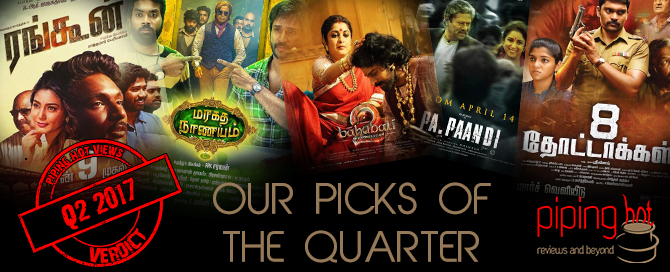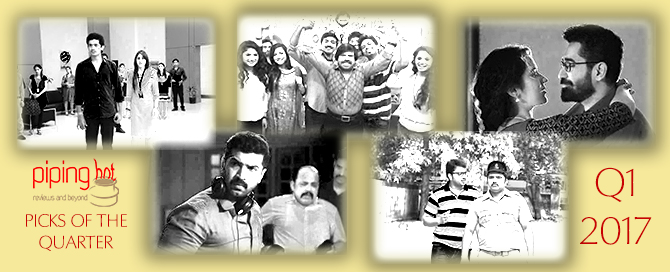After having been mesmerized by Mohanlal last year in the same storyline, the fear that arose when Papanasam was announced as a remake to Drishyam was: "Kamal may do more than sufficient to the role so effortlessly played by Mohanlal and the core of Drishyam – its simplicity- may take a beating". I was confident that I will not be moved much by Kamal's performance as I was in Uttama Villain but now, after the show, I have been proved wrong. In fact I cannot imagine anybody playing that part as well as Kamal has done in Thamizh. No, not even the next best actor in town, Vikram. Yes, Suyambulingam was more expressive and dramatic than George Kutty but Kamal has convinced me that it HAS to be done that way. While I pondered about that thin line between underplaying & being overtly expressive, I found it was more than just a thin line. Itis probably as long, lush and stretched as the Western Ghats that separates two states – Tamilnadu & Kerala. While most of our counterparts from Kerala are known for carrying their roles with subtletly, the greatest actors from Tamil are known for being dramatic – so much so that they get tagged to the generic branding of "Over-acting".
Over-acting is a term that people accuse us of, ever since the times of Marudhur Gopalan Ramachandran more commonly known by his initials M.G.R & Vettaithidal Chinnaiahpillai Ganesan again referred to by his stage name, Sivaji Ganesan. While their paths diverged, with MGR taking the line of a gimmick-filled entertainer appealing to the masses, Sivaji was the man of class associating & styling himself alongside the greats from Hollywood like Jack Lemmon & Marlon Brando. Their performances in films like Miruthanga Chakravathi & Kannan En Kathalan made me even postulate that they indeed are over-acting. But very recently from an Uncle of mine who in the Airlines business, I heard a story of when he was able to question the late great thespian Sivaji on why he had moved his arms extravagantly to act out a scene in Pilot Premnath involving the aircraft turning & returning back to the airport when in actual sense only a little touch was required. Sivaji's reply was, "அப்போ தான் யா ஜனங்களுக்கு போய் சேரும் – Only then will it reach the masses". This sort of took me aback, who had till then assumed that it was just plain inefficiency/misunderstanding that our actors were "over-acting", while all along these actors were perfectly conscious of what they were attempting. Also important to note here is the time when Sivaji did what he did. Hollywood films from the 50s & 60s – even those of Hitchcock and Kubrick – would have its legendary leads be highly expressive to the point of amusing us. Maybe, the grammar was just that there too – to let people get the point.
Even to this date, the point about 'Over-acting' remains within us Tamizh speaking folk & even to the larger audience outside the state. In spite of being so close to each other geographically, people from Tamil Nadu & Kerala do differ in their outlook partly due to the political climate as well as the general up-bringing of the respective communities. I see the masses at Tamil Nadu being more susceptible to emotion rather than a mind-bending act of brilliance – primary reason why we our channels don't have airtime for the likes of Marma Desam Series these days but the 'mega' ones rich in melodrama & why most of our finest thrillers are remakes from Malayalam (From Poovizhi Vaasalile to Mounam Sammadham to Drishyam). Also, the sort of simplicity that audiences in Kerala can take is not what would work here. Take the case of Sibi Malayil's Mohanlal starrer Kireedam. All through the film, Lal would be clad in plain shirts and Lungi, the story being about a police-officer-to-be notwithstanding. It is almost impossible to imagine Ajith doing it the exact same way in A.L.Vijay's Tamizh remake of the film & even if it was done that way, the box-office consequence of such an experiment may have been disastrous.
Coming to Papanasam, the fact that the story is so Pan-Indian is reflected from the response it has got from Malayalam, Telugu, Kannada and hopefully Tamizh & Hindi as well. It is an emotion-filled drama-thriller that also reinforces a much unused plot point – Guilt. Stories surrounding, "The Perfect Murder" i.e. the art of murdering without evidence or concealing the body, are common & have been popular from the times of Hitchcock gives his mastery in films like Rope & Dial M for Murder. But rarely do film-makers touch upon the guilt associated with a crime. Whether the voluntary (or for that matter involuntary) perpetrator, will be able to forgive & forget his own guilt after an act of crime is something extremely relevant for the common man found in every nook & corner of India. More than the brilliance of the police force, such folks surrendering themselves to the law after an act of savage violence are easy to find amidst the case files. This aspect is explored more in another upcoming film, Kuttram Kadithal, but that deserves another column in itself.
Of course, it is a given that Kamal excels in any given role, but more so here as he has to get his pronunciation of the Nellai dialect right in the midst of the umpteen ECU (Extra close up) shots he holds. Not once does he do get into the mass-hero mode who revels after outwitting many, but underplays due to the inherent guilt of the character. His excellence as the romantic husband as well as the selfish vulnerable father yet again indicates his range. Another noticeable point is the amount of space Ananth Mahadevan is given in the climax. That Kamal enthralls one & all with a dazzling climactic monologue is no surprise, but when a character is conversing with the hero, there normally are a couple of intercuts to show the hero's invaluable reactions. Here though, it is refreshing to see the director Jeethu & Kamal give space to Ananth by letting the camera stay on him, who in turn delivers an utterly moving monologue. Another point was the cheeky naming of Kamal as Suyambu Lingam & his prime antagonist, the masterful Kalabhavan Mani as Perumal – the classic Saivite – Vaishnavite tussle, only with a role-reversal this time! No prizes for guessing who might have behind this.
Going back to the prime point made about dramaticism vs restraint showing, if people still think Papanasam is over-the-top than its original, I would like to point out a similar film Pudhiya Paravai where again a perfect murder is the puzzle. After all the hullabaloo through the course of the movie, when the movie leaves you breathless in its final act, the protagonist, Sivaji does an impromptu sneeze in his final confession. You might call it over-acting, I call it Masterclass!
Column written by Anand Sethuraman.







Between,kamal defended sivaji once he was asked question on sivaji’s (over)acting by answering it as “oru velai rasikarkalin rasanai over huh irukkumo” (translation :may be the taste of fans would have been over )
the need for overacting in those times was also driven by the limitations of technology..
the veteran malayalam actress sheela once said in an interview that if you mumbled your line or went for subtlety in its delivery, the mic wouldn’t pick up your voice!! and the technician boy behind the set would yell “orakke parayu sheelamme (speak up sheela) ”
that is probably why actors are seen shouting and barking out their lines in old movies..
as subtle as a jackhammer 😀
Thats a nice write up. I would like to point out that when generations change, over-acting wouldn’t be appreciated.Now Sivaji is ridiculed by today’s youngsters.Second note, You don’t have to undermine tamil fans by too much of detailing (3.15 hrs movie) and over-acting. Let us just examine the character of Suyambu, 1.Is he a strong person or a weak person 2. If he is an emotional (weak) person how would he cover up the murder with all perfection 3. Will he not go to jail that he did it when he watches his daughter getting beaten up by the cops ?
He cries too much…and this character definition is not that. Climax scene is just to ‘over-act’ and make the audience cry, which he did as always…but that character gets damaged there.
I am not a skeptic and I am Kamal fan. Only thing is that I watched Drishyam too and now I admire Lal for his perfection.(not a comparison pls)
Infact, I liked Uthama villain as Kamal played it with ease and he lived that character without any over-acting.
🙂
@bloorockzrav:disqus : you want the character to fit a defintion that you have framed yourself of it .. regardless of the fact that there maybe different shades than what meet the eye. did anyone handover you the script defining the ‘character sketch’ of the protagaonist, even if they did …. its alright that a strong person could cave in at times. in the climax, at the point of his indirect confession, it was evident that the risks are low, and it was his opportunity to seek redemption. its a defining moment .. the audience are drifted in favour of suyambulingam and totally on board with his activities of coverup. even if he had his justifications, when his wife rued on the mother’s feelings, maybe it triggered his guilt senses to surface. it was not an over-act.. it was a forthcoming admission of guilt.. and it could’nt have been done with much subtlety. when the feelings have to transcend beyond the skin of the actor on screen and reach the audience. you would see such measures adopted even by best known method actors.